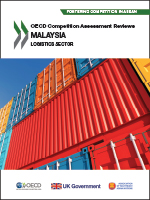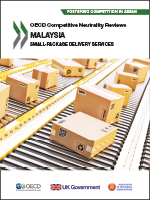Malaysia
Fostering competition in Malaysia
|
Pro-competitive laws and regulations can boost Malaysia’s logistics sector and help drive economic recovery. Malaysia has made significant strides in improving the competitiveness of its logistics sector, in line with the plan to position the country as a regional logistics hub and a gateway to ASEAN. Malaysia’s transport and storage sector accounted for 3.8% of GDP in 2019 and employed 4.4% of the working population. Due to the COVID-19 crisis, Malaysia’s economy contracted by 5.6% in 2020. Logistics companies have been impacted by operational constraints (delivery delays, congestion and higher freight rates) and lower demand in certain sectors. In implementing the OECD’s recommendations, Malaysia can lower regulatory barriers to competition in the logistics sector, which can help support recovery. Fostering competition in ASEAN is a project that reviews regulatory constraints on competition in the logistics sector in all ten ASEAN member countries to identify regulations that hinder the efficient functioning of markets and create an unlevel playing field for businesses. |
How can Competition Help ASEAN Countries Recover from COVID-19? |
It comprises two parallel components: competition assessment reviews of specific logistics sub-sectors and competitive neutrality reviews of small-package delivery services. The project is undertaken in partnership with ASEAN and funded by the ASEAN Economic Reform Programme under the UK Foreign, Commonwealth & Development Office (UK Government).
|
|
|
LAUNCH EVENT
5 October 2021 Two reports, a competition assessment and a competitive neutrality assessment of the logistics sector in Malaysia were virtually launched on 5 October 2021 with the aim to provide robust, pragmatic, non-binding policy recommendations to the government of Malaysia, to help the industry boost overall growth and expedite its recovery from the negative economic impact of the COVID-19 pandemic.
News release |
Other reports under this project
|
Lao PDR |
|
|
Myanmar |
|
|
[email protected] | @OECD_BizFin | #OECDcomp

Related Documents












